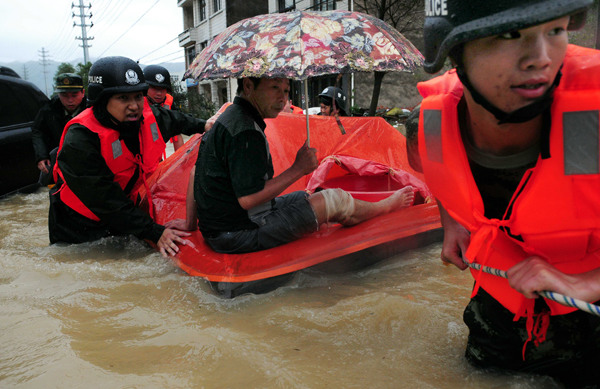

Rescuers transport an injured man to hospital in Wenzhou, Zhejiang province, in the aftermath of Typhoon Fitow on Monday. The man suffered a severed artery in his leg when the typhoon flooded his village, requiring rescuers to walk 10 kilometers to save him. Wu Shuibin / For China Daily
Typhoon Fitow continued to weaken as it moved westward across the mainland on Monday, after packing winds of more than 200 kilometers an hour, forcing hundreds of thousands to evacuate and paralyzing transportation services.
The typhoon was downgraded to a tropical depression with its center located in Jian'ou, Fujian province, at about 9 am on Monday, moving southwest at a speed of 20 km per hour.
By 11 am on Monday, the storm, named after a flower from Micronesia, was so weak that it was impossible for meteorologists to track its center.
Early on Monday, Fitow made landfall in Fuding, Fujian province, causing at least five deaths and four missing in nearby Zhejiang province.
Ni Wenlin, 55, from Dongtou county, Wenzhou, died when a strong wind blew him off a hill late on Sunday night, according to Wenzhou flood- control headquarters. He was with five others on the way to rescue a fisherman from a nearby port.
Chen Wanjie, from Cangnan county, also in Wenzhou, died when his duck breeding factory collapsed and buried him.
Three other people from Ruian died of electric shocks.
Two port workers were missing on Sunday evening and another two fishermen were missing after sailing out to sea on Saturday afternoon.
"Following the landfall, the power of Fitow is abating very fast and its impact on Shanghai and nearby regions is expected to disappear as early as Tuesday," said Zhu Jiehua, a chief service officer at the Shanghai Meteorological Bureau.
Meanwhile, the 24th tropical storm this year, Danas, strengthened to a super typhoon on Monday, packing winds of about 200 km per hour. It hovered over the Pacific Ocean about 750 km to the east of Zhejiang's Zhoushan at 2 pm on Monday and was moving northwest at a speed of 26 km per hour, the Beijing-based National Meteorological Center said.
"Danas is expected to move to the East China Sea later Monday and make a turn northeast," Zhu said. "The possibility of it making landfall on the Chinese mainland is slim but it will bring strong winds to the east coast."
According to meteorologists, it was unusual for a typhoon to come ashore in China's southeast during October — at the end of the season — and Fitow was the strongest typhoon to hit China's east coast in the month since 1951.
Figures provided by the regional flood control departments showed Zhejiang has so far evacuated more than 574,000 people, while in Fujian, 177,000 have been displaced, forcing the National Meteorological Center to issue a red alert against the storm late on Sunday night.
Fitow also flattened houses, caused blackouts and flash floods, stranded passengers on islands and trains and put dams and reservoirs at risk.
In Zhejiang's Cangnan county alone, more than 1,200 houses collapsed in the strong winds, with 356,200 people affected. An initial estimate of the economic losses for the county stood at 420 million yuan ($68.6 million).
In the transportation sector, the storm forced the suspension of 70 bullet trains and route changes for 15 others in several cities in Zhejiang, Fujian and Jiangxi provinces on Monday.
Wenzhou Airport Group said 13 flights were canceled on Monday, and 75 had been canceled on Sunday. In Hangzhou, the capital of Zhejiang, dozens of flights were delayed with a handful canceled on Monday.
In Fujian province, torrential downpours struck a large area on Monday morning. Lin Fangqi, an official with the Sansha town government in Xiapu county, Ningde, said the typhoon caused giant waves that severely damaged the local sea laver farms.
"Many local residents make a living by farming laver. Piles of sheets of laver were slashed by the roaring waves and gales. It was a heart-breaking scene," Lin said.
Lin said the storm also caused blackouts in Xiapu and neighboring counties. In Ningde, about a hundred teams of technicians were dispatched to restore electricity.
Fitow also made an impact on passengers returning from their holidays. Highways across the country reported busy passenger flows on the last day of the Golden Week holiday.
Guan Yongfeng, a Xiamen resident who works in Fuzhou, said the disruption Fitow caused to traffic would prevent lots of people reporting to work.
Due to the suspension of the bullet train service, Guan had to ask around and get a ride from a friend who happened to be heading to Fuzhou on Monday.
"I could find such an alternative because Xiamen is not that far from Fuzhou, but others won't be that lucky if their workplace is distant from their hometown," Guan said.
Typhoon Fitow affects 4.56 mln people in east China
2013-10-08China on alert for next typhoon
2013-10-07Typhoon Fitow leaves 2 dead in E China
2013-10-07Typhoon Fitow makes landfall in E China
2013-10-07Copyright ©1999-2018
Chinanews.com. All rights reserved.
Reproduction in whole or in part without permission is prohibited.